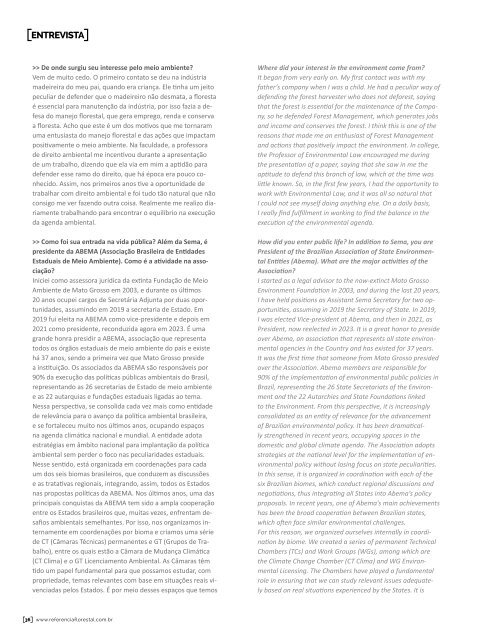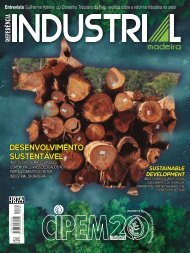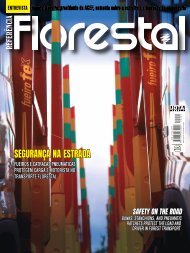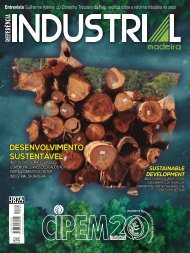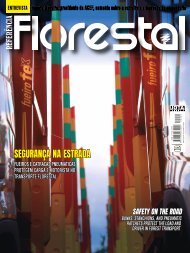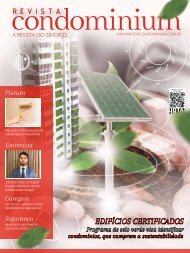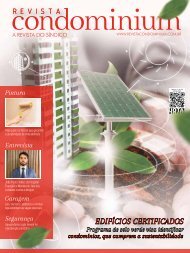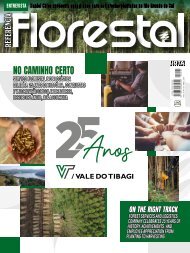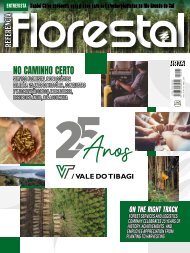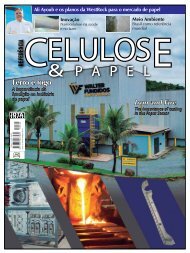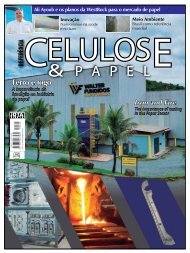Create successful ePaper yourself
Turn your PDF publications into a flip-book with our unique Google optimized e-Paper software.
ENTREVISTA<br />
>> De onde surgiu seu interesse pelo meio ambiente?<br />
Vem de muito cedo. O primeiro contato se deu na indústria<br />
madeireira do meu pai, quando era criança. Ele tinha um jeito<br />
peculiar de defender que o madeireiro não desmata, a floresta<br />
é essencial para manutenção da indústria, por isso fazia a defesa<br />
do manejo florestal, que gera emprego, renda e conserva<br />
a floresta. Acho que este é um dos motivos que me tornaram<br />
uma entusiasta do manejo florestal e das ações que impactam<br />
positivamente o meio ambiente. Na faculdade, a professora<br />
de direito ambiental me incentivou durante a apresentação<br />
de um trabalho, dizendo que ela via em mim a aptidão para<br />
defender esse ramo do direito, que há época era pouco conhecido.<br />
Assim, nos primeiros anos tive a oportunidade de<br />
trabalhar com direito ambiental e foi tudo tão natural que não<br />
consigo me ver fazendo outra coisa. Realmente me realizo diariamente<br />
trabalhando para encontrar o equilíbrio na execução<br />
da agenda ambiental.<br />
>> Como foi sua entrada na vida pública? Além da Sema, é<br />
presidente da ABEMA (Associação Brasileira de Entidades<br />
Estaduais de Meio Ambiente). Como é a atividade na associação?<br />
Iniciei como assessora jurídica da extinta Fundação de Meio<br />
Ambiente de Mato Grosso em 2003, e durante os últimos<br />
20 anos ocupei cargos de Secretária Adjunta por duas oportunidades,<br />
assumindo em 2019 a secretaria de Estado. Em<br />
2019 fui eleita na ABEMA como vice-presidente e depois em<br />
2021 como presidente, reconduzida agora em 2023. É uma<br />
grande honra presidir a ABEMA, associação que representa<br />
todos os órgãos estaduais de meio ambiente do país e existe<br />
há 37 anos, sendo a primeira vez que Mato Grosso preside<br />
a instituição. Os associados da ABEMA são responsáveis por<br />
90% da execução das políticas públicas ambientais do Brasil,<br />
representando as 26 secretarias de Estado de meio ambiente<br />
e as 22 autarquias e fundações estaduais ligadas ao tema.<br />
Nessa perspectiva, se consolida cada vez mais como entidade<br />
de relevância para o avanço da política ambiental brasileira,<br />
e se fortaleceu muito nos últimos anos, ocupando espaços<br />
na agenda climática nacional e mundial. A entidade adota<br />
estratégias em âmbito nacional para implantação da política<br />
ambiental sem perder o foco nas peculiaridades estaduais.<br />
Nesse sentido, está organizada em coordenações para cada<br />
um dos seis biomas brasileiros, que conduzem as discussões<br />
e as tratativas regionais, integrando, assim, todos os Estados<br />
nas propostas políticas da ABEMA. Nos últimos anos, uma das<br />
principais conquistas da ABEMA tem sido a ampla cooperação<br />
entre os Estados brasileiros que, muitas vezes, enfrentam desafios<br />
ambientais semelhantes. Por isso, nos organizamos internamente<br />
em coordenações por bioma e criamos uma série<br />
de CT (Câmaras Técnicas) permanentes e GT (Grupos de Trabalho),<br />
entre os quais estão a Câmara de Mudança Climática<br />
(CT Clima) e o GT Licenciamento Ambiental. As Câmaras têm<br />
tido um papel fundamental para que possamos estudar, com<br />
propriedade, temas relevantes com base em situações reais vivenciadas<br />
pelos Estados. É por meio desses espaços que temos<br />
Where did your interest in the environment come from?<br />
It began from very early on. My first contact was with my<br />
father’s company when I was a child. He had a peculiar way of<br />
defending the forest harvester who does not deforest, saying<br />
that the forest is essential for the maintenance of the Company,<br />
so he defended Forest Management, which generates jobs<br />
and income and conserves the forest. I think this is one of the<br />
reasons that made me an enthusiast of Forest Management<br />
and actions that positively impact the environment. In college,<br />
the Professor of Environmental Law encouraged me during<br />
the presentation of a paper, saying that she saw in me the<br />
aptitude to defend this branch of law, which at the time was<br />
little known. So, in the first few years, I had the opportunity to<br />
work with Environmental Law, and it was all so natural that<br />
I could not see myself doing anything else. On a daily basis,<br />
I really find fulfillment in working to find the balance in the<br />
execution of the environmental agenda.<br />
How did you enter public life? In addition to Sema, you are<br />
President of the Brazilian Association of State Environmental<br />
Entities (Abema). What are the major activities of the<br />
Association?<br />
I started as a legal advisor to the now-extinct Mato Grosso<br />
Environment Foundation in 2003, and during the last 20 years,<br />
I have held positions as Assistant Sema Secretary for two opportunities,<br />
assuming in 2019 the Secretary of State. In 2019,<br />
I was elected Vice-president at Abema, and then in 2021, as<br />
President, now reelected in 2023. It is a great honor to preside<br />
over Abema, an association that represents all state environmental<br />
agencies in the Country and has existed for 37 years.<br />
It was the first time that someone from Mato Grosso presided<br />
over the Association. Abema members are responsible for<br />
90% of the implementation of environmental public policies in<br />
Brazil, representing the 26 State Secretariats of the Environment<br />
and the 22 Autarchies and State Foundations linked<br />
to the Environment. From this perspective, it is increasingly<br />
consolidated as an entity of relevance for the advancement<br />
of Brazilian environmental policy. It has been dramatically<br />
strengthened in recent years, occupying spaces in the<br />
domestic and global climate agenda. The Association adopts<br />
strategies at the national level for the implementation of environmental<br />
policy without losing focus on state peculiarities.<br />
In this sense, it is organized in coordination with each of the<br />
six Brazilian biomes, which conduct regional discussions and<br />
negotiations, thus integrating all States into Abema’s policy<br />
proposals. In recent years, one of Abema’s main achievements<br />
has been the broad cooperation between Brazilian states,<br />
which often face similar environmental challenges.<br />
For this reason, we organized ourselves internally in coordination<br />
by biome. We created a series of permanent Technical<br />
Chambers (TCs) and Work Groups (WGs), among which are<br />
the Climate Change Chamber (CT Clima) and WG Environmental<br />
Licensing. The Chambers have played a fundamental<br />
role in ensuring that we can study relevant issues adequately<br />
based on real situations experienced by the States. It is<br />
36 www.referenciaflorestal.com.br


